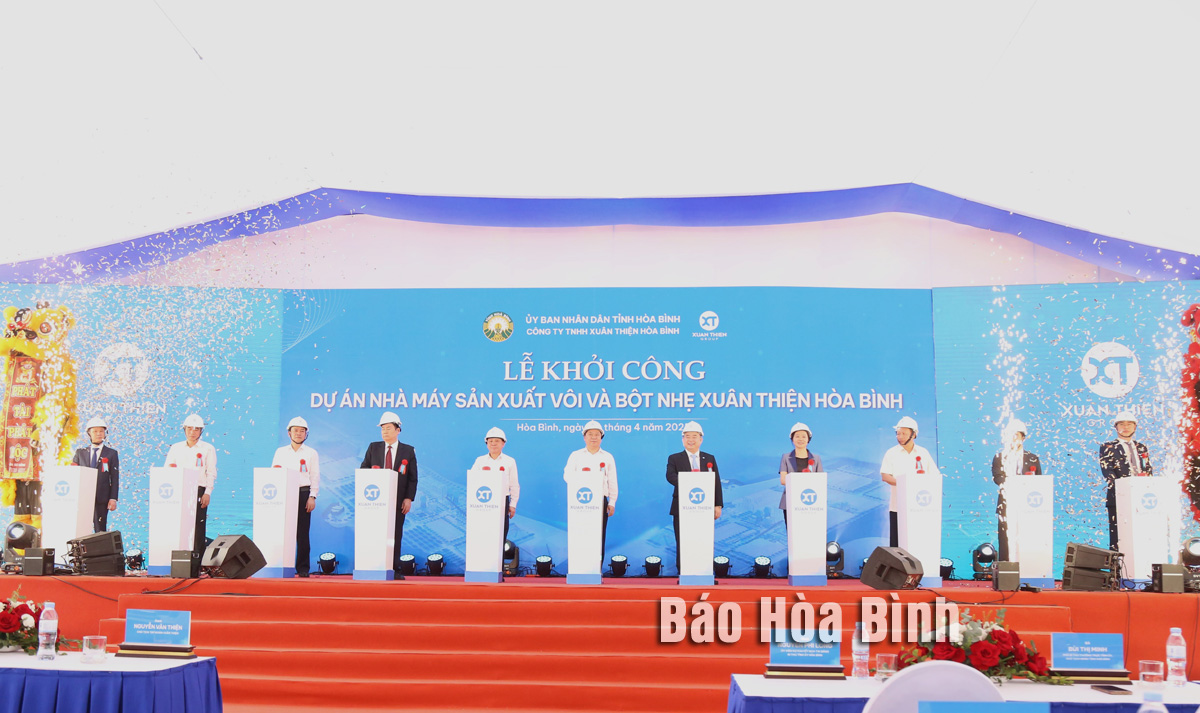
Construction on the Xuan Thien Hoa Binh lime and light powder factory in Yen Bong commune, Lac Thuy district - a key project of Hoa Binh province - started on April 24.
Attending the event were Nguyen Phi Long, alternate member
of the Party Central Committee, Secretary of the provincial Party Committee;
Bui Thi Minh, permanent Deputy Secretary of the provincial Party Committee,
Chairwoman of the provincial People's Council; and Bui Duc Hinh, Deputy
Secretary of the provincial Party Committee, Chairman of the provincial
People's Committee.
The project, totaling more than 8 trillion VND (307.4
million USD), includes a factory with a total capacity of 2.16 million tonnes
a year and a Boi River port with an annual capacity of 8.2 million tonnes,
built on a total area of 158.4 hectares. According to the plan, its first
phase, with a total investment of nearly 3.5 trillion VND and a capacity of
760,000 tonnes a year, will be inaugurated in July 2026, while the entire
project will be completed in July 2027.
The investment in the lime and light powder production plant
is a preparation for proactively providing about 1.5 million tonnes of input
materials each year for Xuan Thien Group's green steel production complexes in
Nam Dinh province and Chan May economic zone in Hue city.

Leaders of the provincial Party Committee and
People's Committee present flower baskets to congratulate Xuan Thien Hoa Binh
Company Limited on the project commencement.
Speaking at the groundbreaking ceremony, Quach Tat Liem,
Vice Chairman of the provincial People's Committee, praised the initial efforts
of the investor and related units to start the project as planned.
He affirmed that the project, once operational, will create
more jobs and income for local people, increase revenue for the state budget;
promote production and business sectors; contribute to the completion of
socio-economic development goals as set in the Hoa Binh provincial Master Plan
for the 2021-2030 period, with a vision to 2050, and Resolution of the 17th
provincial Party Congress, creating momentum for the province's industrial
development in the 2025-2030 period.
Liem requested departments, sectors, authorities of Lac Thuy
district and Yen Bong commune, and local residents to facilitate the project
implementation.
Dao Village’s honey – a product certified with a 3-star OCOP (One Commune One Product) rating by Thong Nhat Agricultural Cooperative in Dao Village (Hoa Binh City) – is highly regarded by consumers for its quality, richness, and variety in packaging. The distinctively sweet taste of Dao Village’s honey leaves a lasting impression on anyone who has tried it.
In alignment with Project No. 07-DA/TU, issued by the Hoa Binh provincial Party Committee on November 1, 2021, Lac Thuy district has actively promoted investment and supported the sustainable development of its industrial and handicraft sectors during the 2021–2025 period. Alongside this, the district has remained committed to preserving and revitalising traditional craft villages.
Located in the northern part of Lac Thuy district, with a temperate climate and fertile soil, Phu Thanh commune has great potential and advantages in growing tea. The long-standing experience, combined with strict adherence to organic farming practices in the tea gardens, ensures that the dried tea products from Phu Thanh and Lac Thuy as a whole are sold out immediately upon production, providing a stable and prosperous life for the local people.
Amid efforts to streamline the administrative apparatus, Hoa Binh province has intensified measures to address challenges in land clearance, resettlement support, and infrastructure investment, aiming to speed up the progress of key projects.
Hoa Binh province has posted an unprecedented economic growth rate of 12.76% in the first quarter of 2025, marking its highest quarterly performance to date and positioning it as the second fastest-growing locality in the country, trailing only Bac Giang province.
Under current regulations, products in the One Commune – One Product (OCOP) programme that are rated three stars or higher must undergo re-evaluation every three months. However, in reality, some of these products fail to consistently meet the required standards, raising concerns about the sustainability of their OCOP certification. This underscores the urgent need for producers to enhance product quality and gradually develop their OCOP products into strong, marketable brands.



